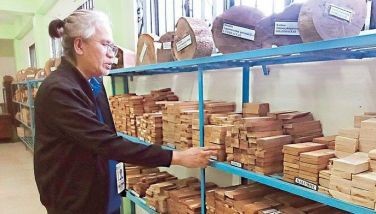Special Report: Photokina boasts of ‘dream team’
February 25, 2002 | 12:00am
Click here to read Part I
Photokina Marketing Corp., the winning bidder in the Commission on Elections (Comelec)’s Voter’s Registration and Identification System (VRIS) project, boasts of a consortium composed of highly skilled, highly developed and technologically advanced companies.
"We are very proud to say that the team Photokina assembled is a dream team in security imaging," says Enrique Noora, Photokina vice president for special projects.
The VRIS project team is made up of Photokina, Polaroid, Unisys, Headstrong, US-based IBM and French security company Sagem. The consortium won the project to automate the country’s electoral process following one of the most exhaustive and highly technical bidding procedures ever conducted by the Comelec two years ago.
Polaroid is the top manufacturer of secure identification (ID) cards while Sagem is an expert on fingerprinting systems used by the US Federal Bureau of Investigation (FBI) and police forces in the European community.
Unisys is considered a major integrator while Headstrong is known for its expertise in "change management."
"These companies have worked with each other before. That is the beauty of it all. They know what they are doing, that is why they were able to lower the bid," Noora said.
He said their bid was P6.588 billion, which would cover the project for five years. It bested the field by garnering the highest technical score and submitting the lowest price, outbidding its closest rival by more than P500 million.
Noora said that from an initial group of 22 companies, the field was narrowed down to six pre-qualified bidders.
Only three submitted the final bids: Photokina, Ultimate Scientific Development Corp. which is a consortium of Acer and Columbia; and the Stradec consortium.
"We received the highest technical score. We were the closest to the ideals required by the terms of reference, the terms of the bid, or the invitation for bid, which involved a very detailed, two-year study," says George Balagtas, Photokina vice presidnet.
Noora pointed out that based on the cost of P6.5 billion divided by the estimated number of voters of 40 million, an ID card would only cost P162.50 per voter.
"The ID card would last for 10 years," he said. "A driver’s license would cost even more which is only good for three years."
Norra stressed that the cost would cover the entire system, not just the ID cards.
"The system, once it is set up, would only be maintained and upgraded every few years. This is a system for continuing registration, not just a system functioning only up to 2004," Noora said.
He explained that just like just like in any computerized equipment, the system would obviously have changes in the future.
"But we’ll have to start somewhere. Our system is software-based, which is more stable. If you are hardware based, cost of maintenance is even higher," he said.
Noora said the VRIS project will ensure that a person’s right to vote is guaranteed.
"No one else will be able to use a person’s identity," he said.
"We are very proud to say that the team Photokina assembled is a dream team in security imaging," says Enrique Noora, Photokina vice president for special projects.
The VRIS project team is made up of Photokina, Polaroid, Unisys, Headstrong, US-based IBM and French security company Sagem. The consortium won the project to automate the country’s electoral process following one of the most exhaustive and highly technical bidding procedures ever conducted by the Comelec two years ago.
Polaroid is the top manufacturer of secure identification (ID) cards while Sagem is an expert on fingerprinting systems used by the US Federal Bureau of Investigation (FBI) and police forces in the European community.
Unisys is considered a major integrator while Headstrong is known for its expertise in "change management."
"These companies have worked with each other before. That is the beauty of it all. They know what they are doing, that is why they were able to lower the bid," Noora said.
He said their bid was P6.588 billion, which would cover the project for five years. It bested the field by garnering the highest technical score and submitting the lowest price, outbidding its closest rival by more than P500 million.
Noora said that from an initial group of 22 companies, the field was narrowed down to six pre-qualified bidders.
Only three submitted the final bids: Photokina, Ultimate Scientific Development Corp. which is a consortium of Acer and Columbia; and the Stradec consortium.
"We received the highest technical score. We were the closest to the ideals required by the terms of reference, the terms of the bid, or the invitation for bid, which involved a very detailed, two-year study," says George Balagtas, Photokina vice presidnet.
Noora pointed out that based on the cost of P6.5 billion divided by the estimated number of voters of 40 million, an ID card would only cost P162.50 per voter.
"The ID card would last for 10 years," he said. "A driver’s license would cost even more which is only good for three years."
Norra stressed that the cost would cover the entire system, not just the ID cards.
"The system, once it is set up, would only be maintained and upgraded every few years. This is a system for continuing registration, not just a system functioning only up to 2004," Noora said.
He explained that just like just like in any computerized equipment, the system would obviously have changes in the future.
"But we’ll have to start somewhere. Our system is software-based, which is more stable. If you are hardware based, cost of maintenance is even higher," he said.
Noora said the VRIS project will ensure that a person’s right to vote is guaranteed.
"No one else will be able to use a person’s identity," he said.
BrandSpace Articles
<
>
- Latest
- Trending
Trending
Latest
Trending
Latest
Recommended






























